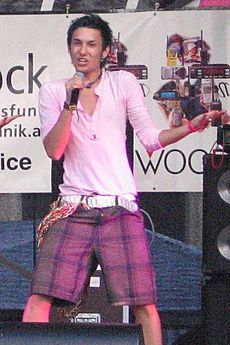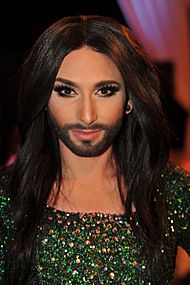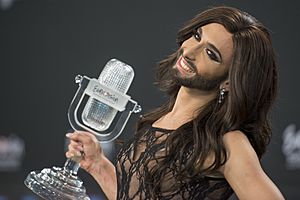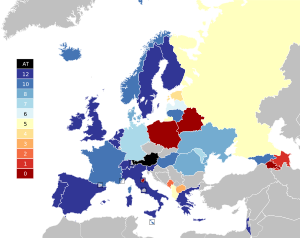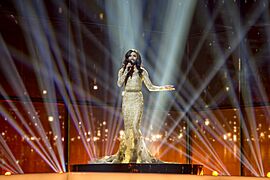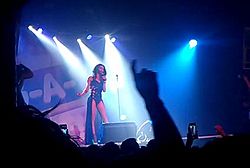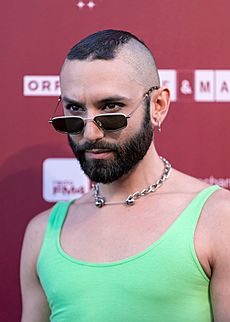Conchita Wurst facts for kids
Quick facts for kids
Conchita Wurst
|
|
|---|---|
| Birth name | Thomas Neuwirth |
| Also known as |
|
| Born | 6 November 1988 Gmunden, Austria |
| Genres | |
| Occupations |
|
| Years active | 2006–present |
| Labels | Sony Music Austria |
| Associated acts | Jetzt Anders! |
Thomas Neuwirth, also known as Tom, is an Austrian singer and media personality. He is most famous for his stage character, Conchita Wurst. As Conchita, he won the Eurovision Song Contest 2014 for Austria with the song "Rise Like a Phoenix".
Conchita Wurst is a drag queen, which is a performance artist who uses clothing and makeup to create a specific character. Conchita is known for her glamorous look, which includes a beard. This unique style helped bring her international attention.
Before becoming famous as Conchita, Tom Neuwirth had a career in music. He was on a TV talent show and was part of a boy band. In 2011, he started performing as Conchita. After winning Eurovision, Conchita became a global star and an important figure for the LGBT community, speaking about acceptance and respect.
Contents
Early Life and First Steps in Music
Thomas Neuwirth was born on November 6, 1988, in Gmunden, Austria. He grew up in the small town of Bad Mitterndorf. He said that growing up in a small village could be difficult if you felt different.
From a young age, he knew he was different from other kids. When he was 14, Neuwirth moved to the city of Graz to study fashion. One of his biggest style inspirations was Victoria Beckham.
In 2006, Neuwirth competed in the Austrian TV talent show Starmania and finished in second place. A year later, he started a boy band called Jetzt Anders!, but the group did not last long.
The Creation of Conchita Wurst
After his early music career, Neuwirth created his famous drag character, Conchita Wurst. A drag character is like an actor playing a role. Conchita is a female character with a beard.
Neuwirth explained the name "Wurst" comes from a German phrase, "Das ist mir doch alles Wurst." This phrase means "it's all the same to me" or "I don't care." He said the name "Conchita" came from a Cuban friend.
He said the beard is a statement. It shows that you can achieve anything, no matter who you are or how you look. The character of Conchita first appeared on an Austrian TV show in 2011. In 2012, she competed to represent Austria in Eurovision but came in second place in the national competition.
Winning the Eurovision Song Contest
Representing Austria
On September 10, 2013, Austria's national television station, ORF, announced that Conchita would represent the country at the Eurovision Song Contest 2014. The contest was held in Copenhagen, Denmark.
Her song was "Rise Like a Phoenix". Many people thought she had a good chance to win. Her performance was powerful and serious, and she stood on stage alone, which made her stand out.
Facing Challenges
Not everyone was happy with Conchita's selection. Some conservative groups, especially in Eastern Europe, criticized her. In Austria, an "Anti-Wurst" page on Facebook gained many followers.
In countries like Russia and Belarus, people started petitions to have her performance removed from the TV broadcast. Some politicians made negative comments, calling her performance "propaganda."
In response, many people across Europe supported Conchita. They saw a vote for her as a vote against intolerance. They believed her performance sent a strong message of acceptance.
A Historic Victory
On May 10, 2014, Conchita Wurst won the Eurovision Song Contest with 290 points. It was Austria's first Eurovision win since 1966. It was also the first time a singer won without any backup singers or dancers since 1970.
Conchita received high scores from many countries in Western Europe. She also got support from some Eastern European countries like Georgia and Ukraine.
When she received the trophy, Conchita said, "We are unity and we are unstoppable." She later explained this message was for anyone who opposed equal rights.
Global Impact and Later Career
Conchita's victory was celebrated around the world. When she returned to Austria, over 1,000 fans greeted her at the airport. The President of Austria, Heinz Fischer, said her win was a victory for "diversity and tolerance in Europe."
She became an icon for the LGBT community. She was invited to perform at Pride parades in London, Madrid, and Manchester. She also spoke at the European Parliament and the United Nations Office in Vienna. At the UN, she met with Secretary-General Ban Ki-moon, who called her a "cultural icon."
After Eurovision, Conchita continued her career in music and fashion.
- She walked the runway for fashion designer Jean Paul Gaultier in Paris.
- She released her first album, Conchita, in 2015.
- She hosted the "green room" at the Eurovision Song Contest 2015 in Vienna.
- In 2018, she released another album, From Vienna with Love, with the Vienna Symphony orchestra.
In 2019, Neuwirth announced he would perform as two different characters. Conchita would continue with a feminine style, while a new character named Wurst would have a more masculine style. He released the album Truth Over Magnitude as Wurst.
In 2020, Conchita made a guest appearance in the Netflix movie Eurovision Song Contest: The Story of Fire Saga.
Personal Life
Neuwirth has said that using the character of Conchita is similar to how other artists, like Beyoncé or Lady Gaga, use stage personas. It helps him keep his private life separate from his public performances.
In 2018, Neuwirth shared personal information about his health. He did this to stand up against threats from a former partner and to show that no one should be made to feel ashamed. His message was one of courage and honesty.
Discography
- Conchita (2015)
- From Vienna with Love (2018, with the Vienna Symphony)
- Truth Over Magnitude (2019)
See also
 In Spanish: Conchita Wurst para niños
In Spanish: Conchita Wurst para niños
- Verka Serduchka – a drag fictional character Eurovision entrant
- Silvía Night – a fictional character Eurovision entrant
- DQ – a drag queen Eurovision entrant
- Sestre – a drag band of Eurovision entrants
- Dana International – the 1998 Eurovision winner, a trans woman from Israel
 | Aaron Henry |
 | T. R. M. Howard |
 | Jesse Jackson |


